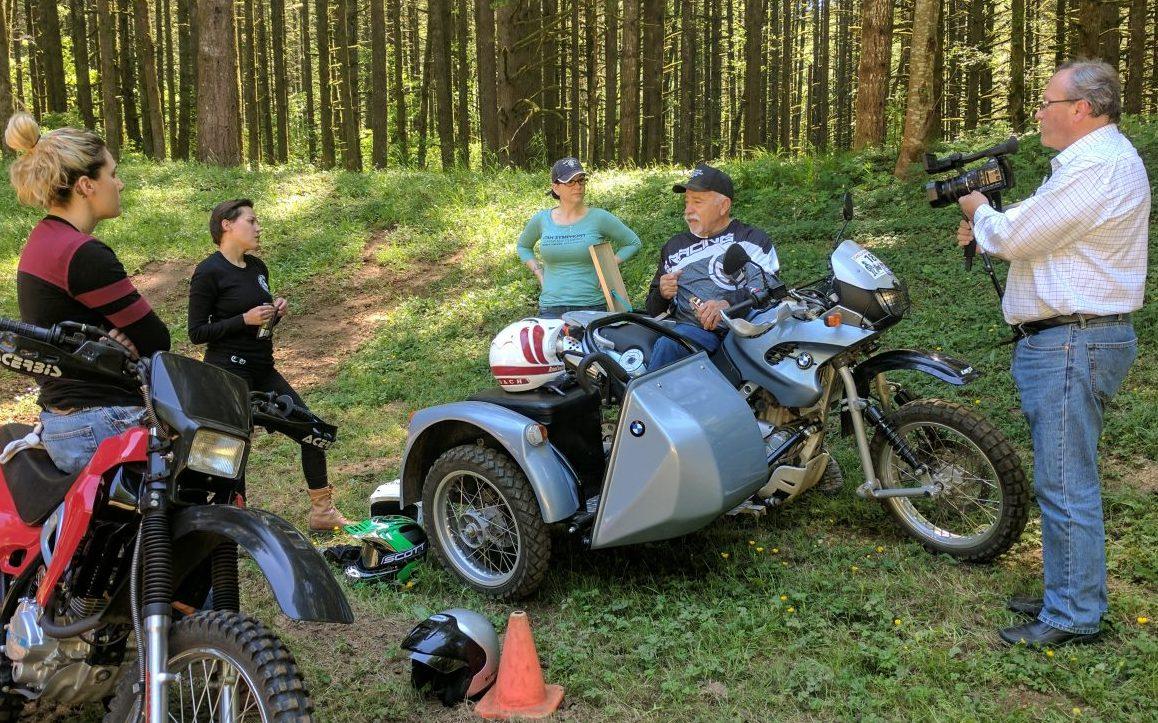BY KRIS FANT
Riding is much more than jumping on a motorcycle and twisting the throttle. I’d like to give you a peek into my conversations with Coach, in the hopes that this will help you develop in your own riding self assessment and training.
About Coach
KRIS: Coach, what is your philosophy of coaching?
COACH: That’s a big question; let me give you three principles I go by.
1) Student-Centered Coaching.
2) Mind-Body first, then Mind-Body-Bike. Then Mind-Body-Bike-Discipline.
3) Simple to Complex Instruction. We start where you are now and build forward towards your riding goals. Progressive Loading. Learning is like a long stairway where each step takes you a little higher on the learning curve.
KRIS: How did you learn this style of coaching?
COACH: I was a Captain for the Los Angeles City Fire Department. My assignment included being a training officer so the department sent me to many instructor schools to learn proper teaching methods for such a dangerous job. On my days-off I was racing at Ascot Park, Southgate Speedway, Elsinore, Perris, Long Beach Indoors and Carlsbad Raceway. I was in the heart of American motorcycle racing and loved it! When I wasn’t racing, I taught motorcycle riding at Saddleback Park.
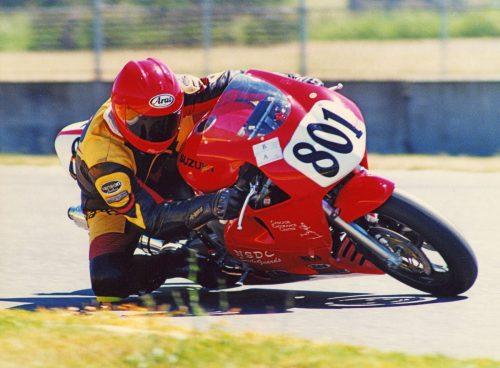
After twenty years in the fire service I became the State Director of Fire Service Training in Oregon. I was still teaching in that position, only now it was for both paid and volunteer firefighters. For the first time I was helping women learn how to do dangerous things in tough conditions. This opened the door for more schooling, instructor certificates, and becoming adjunct faculty at the National Fire Academy, giving me the opportunity for even more training about adult learning.
All the while I was still teaching motorcycle riding on my days off using my fire service skills and racing background. In 1990, I took an early retirement and opened a Motorcycle Safety Foundation certified off-road training center in the Cascade Mountains of Oregon. I have been teaching there and around the world for more than 20 years.
KRIS: Over the years, what have been your observations about the ways men and women learn differently?
COACH: When coaching I treat each person as unique. You do not fit into a group for me. You are you. That being said, there are some general characteristics that I must adapt to as a coach: strength, endurance, range-of-motion, body-type, etc. We try to group similar with similar physically. We also try to group by skill and knowledge levels and the type of riding to be done.
At this point personal preference enters the picture. Women often ask for all-women classes. They don’t want to be in with the guys for many reasons. Also, we have noticed over the years that husband and wives are sometimes better served in separate classes; so we make sure they know that is an option. For me, it’s the riders that control the class, and we adapt to their needs.
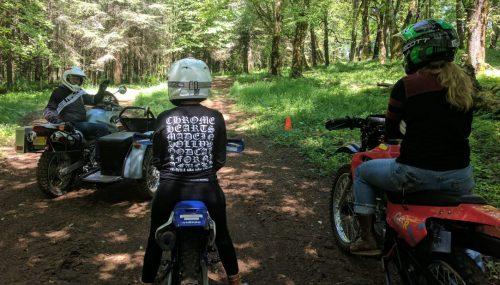
Now that you know a bit about where Coach is coming from, I asked some questions to better understand how to apply the mind-body-motorcycle connection and stairway of knowledge.
Mind
KRIS: Can you tell me more about self-talk, and its role in riding?
COACH: My experience as a coach and as a competitor in many motorcycle disciplines leads me to believe that we create our own reality in our helmets. We have an ongoing internal conversation with ourselves that usually leads to some judgement, emotion or decision. The problem with this self-talk-in-the helmet model is that there is little opportunity for critical feedback or external analysis of our thinking.
When we go it alone like this we sometimes get stuck in what I call a “behavior rut.” This is when we say to ourselves, “I think and/or fear that only possible outcome of ‘x’ is ‘y’.Sometimes we even make “y’ happen so we won’t be wrong. My job as a coach is to show you that there are many possible outcomes for “x’, and to teach you how to pick the best one for any given situation and, then, how to make it happen.
Kris, may I use you as an example, please? To hang some laundry for all to see? You often have a hard time with slow-speed, tight turns in the rough. I watch your eyes and see your self-talk: “I need to do this, this and this”. Then you start the turn and your body does it’s own thing automatically. Look down instead of up. Roll the gas up and down instead of steady at a torque-producing RPM in the friction zone. Leaning-in instead of staying up and gravity-neutral.
What’s going on? You know what to do, but sometimes you can’t make your body do it! Why?
First, you give yourself permission to fail. How do I know? Almost every time something goes wrong you laugh. It’s all over the video tapes. Not a laughter of pleasure but a conditioned response to failure. You excuse yourself with laughter.
What I do in this situation as your coach is to let you do your own thing and not push you too hard or make you feel bad. But I do point out to you what I see and give you video tapes so you can see for yourself. We have been working on this for many weeks now and you are getting better and better. You are learning the accept your failure and to use it as a tool to analyze yourself. The laughter is going away and you are becoming much more focused. Now you just stop and ask yourself, Why didn’t I pull that turn off? Then you fix it in your head and go try it again. Unfortunately this growth process has been very slow and time consuming.
For me, the difference between an instructor and a coach is that a coach helps you develop mental and emotional skills as well as teaches you how to ride your motorcycle.
This is important so let me say it again. To become a great rider you have to learn to be self-critical on a highly-detailed level and do so without taking it personally. Learn to be positive about your mistakes, failures and losing. I am not saying accept failure, but rather to appreciate the opportunity to learn by determining what went wrong. I encourage folks gently not to make the same mistake twice. Well, some more gently than others!
This mental attitude about failure assumes a fundamental coaching principle: There is never a justification for an injury during motorcycle training. While I talk about making mistakes, please remember I am assuming we are in a controlled training environment using a reasonable, progressive-loading model. It’s small steps over time up the stairway of learning – with the coach as the handrail if needed.
Mind-Body
KRIS: I’ve noticed with daily exercise that instead of being sore after riding, I wake up tired the next day.
COACH: There is a big difference between soreness and fatigue. Soreness generally relates to one’s musculature and fatigue to the cardiovascular system and nutrition. Both are affected by hydration and electrolyte balance. Your recent step-bench tests tell me you are doing better with strength, but your cardio recovery rates remain constant. To see improvement you need to do a better job with your cardio-exercise program. Are you consistently using the heart rate x time model we talked about? At least three solid workouts per week? I suspect not, otherwise we would have seen some improvement by now. I am not being judgmental, only observant. Only you can be critical of your program. My job is to give you feedback and to help you make good choices.
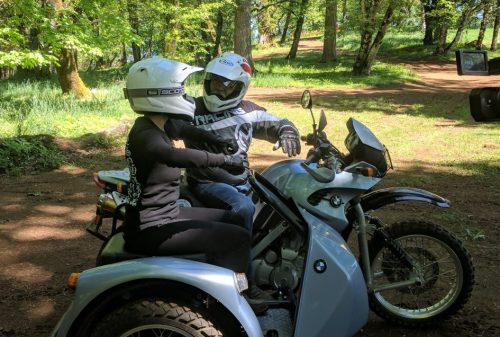
Mind-Body-Bike
KRIS: I appreciated your feedback about u-turns. How do I take the pressure off of myself in the moment, and just focus on the skills?
COACH: Use the foot-pegs-UP evaluation process to take pressure off yourself. One body part at a time is easy. Trying to do all body parts at once is hard. Also stopping, getting off the bike and walking through the turn or challenge is a perfect exercise. Motorcycle Tai Chi © connects your mental picture with your body. THEN, get on your bike and make it happen.
To Review
This is just a small sample of the level of detail each rider can utilize in analyzing their own riding skills and of the in-depth insight you can gain from working with a coach. Start with the mind. Why do you want to do this? What is your goal? Take time to notice your self talk. Notice when you are hard on yourself, and when you let yourself off the hook. Before doing something, see if you can verbalize what you are going to do with your body. Get off your bike and walk through it. On your bike, think about one body part at a time, one movement at a time, and then complete the task. Analyze how it went, and make small changes as you go.
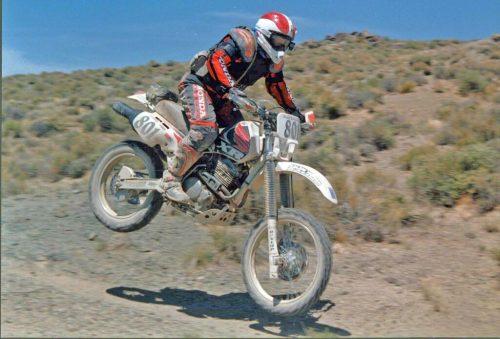
For more about Coach Stroud, check out Kris’s article about STUDENT FOCUSED COACHING or COACH’S WEBSITE.

